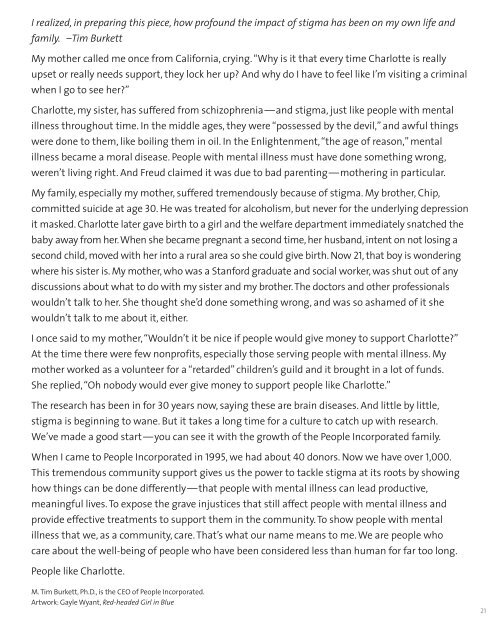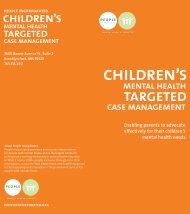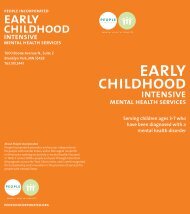PEOPLE INCORPORATED PEOPLE INCORPORATED
PEOPLE INCORPORATED PEOPLE INCORPORATED
PEOPLE INCORPORATED PEOPLE INCORPORATED
You also want an ePaper? Increase the reach of your titles
YUMPU automatically turns print PDFs into web optimized ePapers that Google loves.
I realized, in preparing this piece, how profound the impact of stigma has been on my own life and<br />
family. –Tim Burkett<br />
My mother called me once from California, crying.“Why is it that every time Charlotte is really<br />
upset or really needs support, they lock her up? And why do I have to feel like I’m visiting a criminal<br />
when I go to see her?”<br />
Charlotte, my sister, has suffered from schizophrenia—and stigma, just like people with mental<br />
illness throughout time. In the middle ages, they were “possessed by the devil,” and awful things<br />
were done to them, like boiling them in oil. In the Enlightenment,“the age of reason,” mental<br />
illness became a moral disease. People with mental illness must have done something wrong,<br />
weren’t living right. And Freud claimed it was due to bad parenting—mothering in particular.<br />
My family, especially my mother, suffered tremendously because of stigma. My brother, Chip,<br />
committed suicide at age 30. He was treated for alcoholism, but never for the underlying depression<br />
it masked. Charlotte later gave birth to a girl and the welfare department immediately snatched the<br />
baby away from her.When she became pregnant a second time, her husband, intent on not losing a<br />
second child, moved with her into a rural area so she could give birth. Now 21, that boy is wondering<br />
where his sister is. My mother, who was a Stanford graduate and social worker, was shut out of any<br />
discussions about what to do with my sister and my brother.The doctors and other professionals<br />
wouldn’t talk to her. She thought she’d done something wrong, and was so ashamed of it she<br />
wouldn’t talk to me about it, either.<br />
I once said to my mother,“Wouldn’t it be nice if people would give money to support Charlotte?”<br />
At the time there were few nonprofits, especially those serving people with mental illness. My<br />
mother worked as a volunteer for a “retarded” children’s guild and it brought in a lot of funds.<br />
She replied,“Oh nobody would ever give money to support people like Charlotte.”<br />
The research has been in for 30 years now, saying these are brain diseases. And little by little,<br />
stigma is beginning to wane. But it takes a long time for a culture to catch up with research.<br />
We’ve made a good start—you can see it with the growth of the People Incorporated family.<br />
When I came to People Incorporated in 1995, we had about 40 donors. Now we have over 1,000.<br />
This tremendous community support gives us the power to tackle stigma at its roots by showing<br />
how things can be done differently—that people with mental illness can lead productive,<br />
meaningful lives. To expose the grave injustices that still affect people with mental illness and<br />
provide effective treatments to support them in the community. To show people with mental<br />
illness that we, as a community, care. That’s what our name means to me. We are people who<br />
care about the well-being of people who have been considered less than human for far too long.<br />
People like Charlotte.<br />
M. Tim Burkett, Ph.D., is the CEO of People Incorporated.<br />
Artwork: Gayle Wyant, Red-headed Girl in Blue<br />
21












